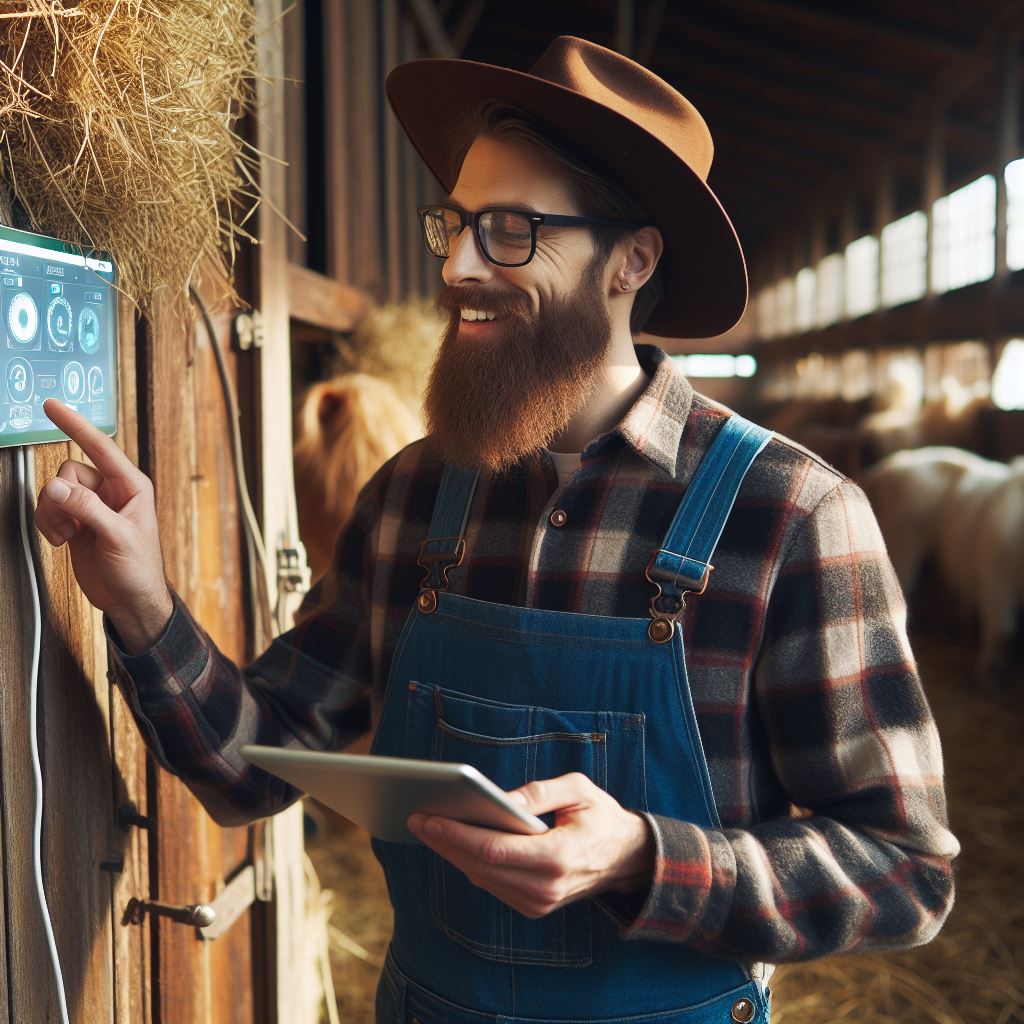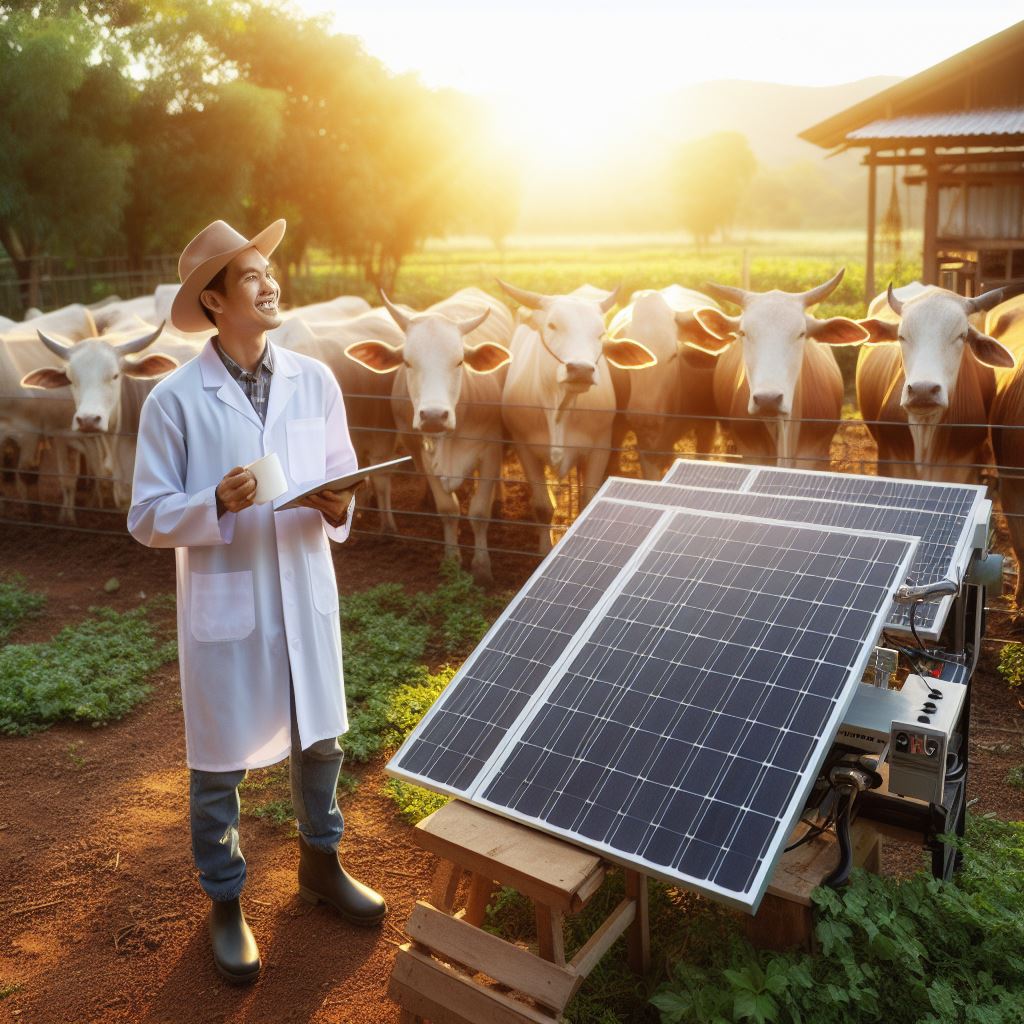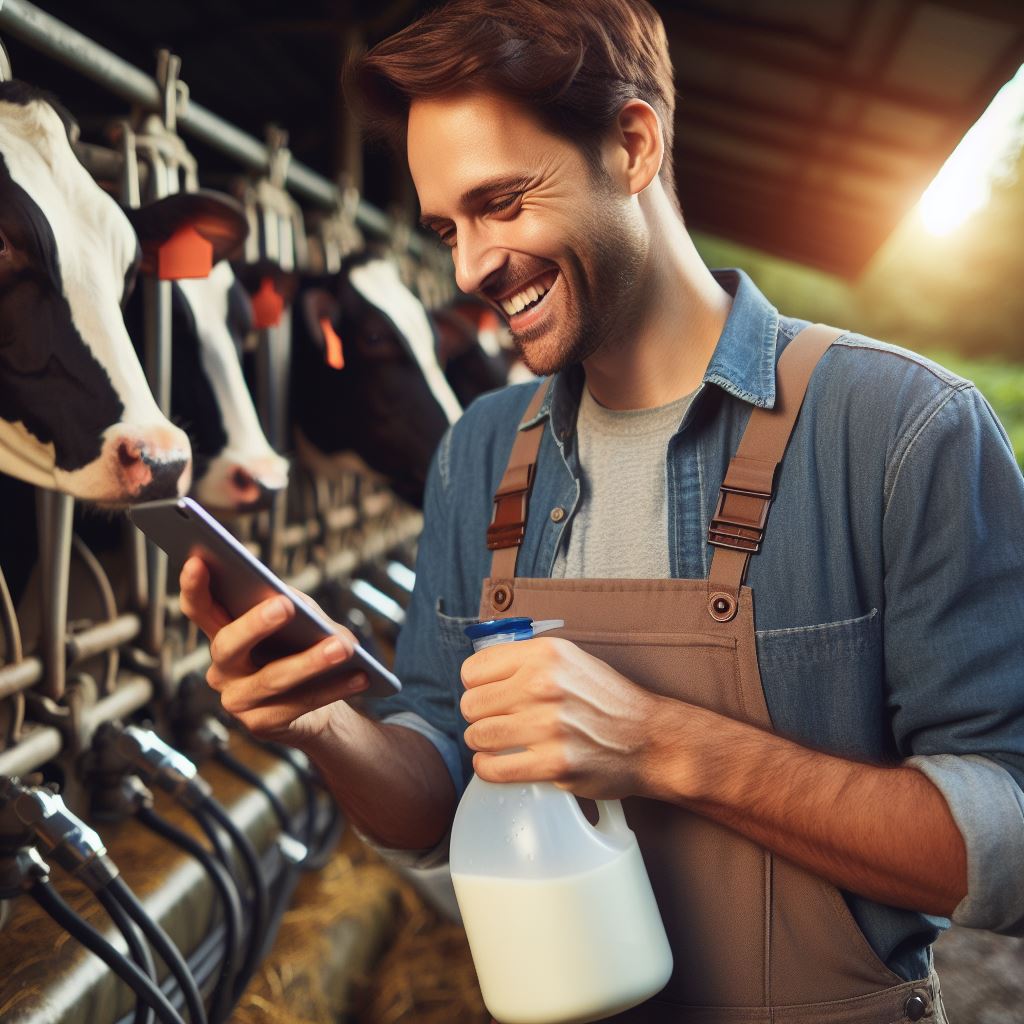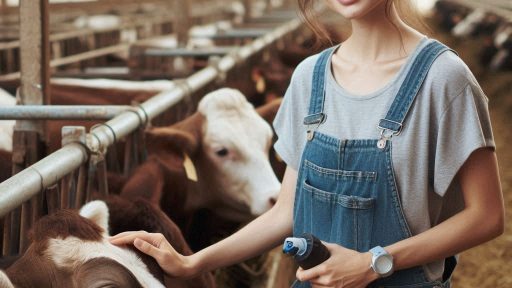Introduction
Smart Barns Tech in Livestock Care is revolutionizing the way livestock care is conducted by integrating technology into the process
These technologically advanced barns are designed to enhance the well-being of farm animals.
Incorporating technology into livestock care is crucial for improving the efficiency and effectiveness of farming operations.
It allows farmers to monitor and control various aspects of animal husbandry, leading to better animal health and productivity.
The purpose of this blog post is to educate and inform readers about the benefits and significance of smart barns in modern livestock care.
By exploring the definition, importance, and application of technology in farming, readers will gain a comprehensive understanding of this emerging trend.
Smart barns utilize a combination of sensors, data analytics, and automation to optimize animal welfare. They enable farmers to remotely monitor vital signs, track feeding schedules, and detect health issues early on.
By integrating technology, farmers can provide a comfortable and stress-free environment for their livestock while also streamlining their daily routines.
This not only benefits the animals but also improves productivity and reduces labor and costs.
Furthermore, smart barns contribute to sustainable farming practices by minimizing resource wastage and reducing the environmental impact.
They allow for precise control of temperature, ventilation, and lighting, creating optimal conditions for the animals.
Smart barns are transforming livestock care through the integration of technology.
The benefits they offer in terms of animal welfare, productivity, and sustainability make them a valuable asset in the modern farming industry.
This blog post aims to shed light on this innovative approach and inspire further exploration of this exciting field.
Benefits of Using Tech in Livestock Care
Using technology in livestock care has numerous benefits that significantly improve the efficiency and effectiveness of farm operations.
Transform Your Agribusiness
Unlock your farm's potential with expert advice tailored to your needs. Get actionable steps that drive real results.
Get StartedBy integrating smart barns and advanced tech solutions, farmers can enhance animal health monitoring, feeding and nutrition management, and waste management practices.
Improved animal health monitoring
- Sensors to track vital signs allow farmers to continuously monitor the health status of their livestock.
- This technology provides real-time information on temperature, heart rate, and other vital parameters.
- Early disease detection is crucial for minimizing outbreaks and preventing the spread of illnesses.
- Tech-based monitoring systems can quickly identify any abnormalities in the animals’ behavior or vital signs, enabling swift intervention and treatment.
- Real-time data analysis enables farmers to collect and analyze large amounts of data from sensors, helping them identify patterns and trends related to animal health.
- This information allows for proactive measures to be taken to prevent potential health issues.
Enhanced feeding and nutrition management
- Automated feeding systems provide precise and timely delivery of feed.
- This eliminates the need for manual feeding, saving time and reducing the risk of human error. These systems can also adjust feed portions based on the animals’ specific needs.
- Precision nutrition, based on individual needs, ensures that each animal receives the optimal diet for growth, production, and overall well-being.
- By analyzing data on weight, body condition, and performance, farmers can tailor nutrition plans accordingly.
- Optimized feed conversion rates contribute to cost savings and reduce environmental impact.
- Smart feeding systems can adjust and optimize feed rations to minimize waste and maximize feed efficiency, resulting in healthier and more sustainable livestock operations.
Efficient waste management
- Automated waste removal systems remove manure and other waste materials promptly, reducing the risk of bacterial contamination and foul odors.
- This automation enhances hygiene and keeps the barn environment clean, promoting animal health.
- Sensors to monitor waste levels provide real-time information on waste accumulation, enabling farmers to plan efficient waste removal strategies.
- This technology helps avoid overflows and ensures proper waste disposal, minimizing environmental risks.
- Environmentally sustainable practices incorporate the use of technology to reduce the environmental impact of livestock operations.
- By monitoring waste management, energy consumption, and water usage, farmers can adopt sustainable practices and minimize their carbon footprint.
In short, the integration of technology in livestock care brings significant benefits to farmers and the overall sustainability of livestock operations.
Improved animal health monitoring allows for early disease detection and proactive interventions. Enhanced feeding and nutrition management optimize feed conversion rates and improve animal well-being.
Efficient waste management systems contribute to a clean and sustainable environment. Embracing smart barns and technology in livestock care is a win-win situation, benefiting both farmers and the animals they raise.
Read: Wool vs. Hair Sheep: What’s Best?
Technology Solutions for Smart Barns
To create and maintain smart barns, it is essential to integrate the latest technological solutions. These solutions enable farmers to enhance livestock care, automate processes, and optimize overall farm management.
Approaches such as Internet of Things (IoT) devices, data analytics, and cloud computing, as well as automation and robotics, play a crucial role in transforming traditional barns into high-tech, efficient environments.
Internet of Things (IoT) devices
Sensors for temperature, humidity, and CO2 levels
Installing various sensors throughout the barn allows farmers to monitor crucial environmental factors. Real-time data on temperature, humidity, and CO2 levels help ensure optimal living conditions for the livestock.
Wearable health trackers for livestock
Livestock-wearing health trackers facilitate continuous health monitoring. These devices can detect anomalies and alert farmers to potential health issues promptly, allowing for timely intervention.
Smart cameras for surveillance
By integrating smart cameras, farmers can remotely monitor their livestock for signs of distress, behavior changes, or any unusual activity. This helps prevent potential threats or diseases from spreading rapidly.
Data analytics and cloud computing
Collecting and analyzing real-time data
With data collection systems in place, farmers can gather real-time information from various devices and sensors.
This data can then be analyzed to identify patterns, trends, and anomalies, enabling proactive decision-making.
Smart algorithms for predictive analytics
By applying smart algorithms to the collected data, farmers can predict potential issues or diseases.
This allows for timely actions, such as adjusting feed, providing specific treatments, or isolating affected animals, to prevent the spread of illnesses.
Cloud storage for easy data access and sharing
Storing data in the cloud provides farmers with easy access to historical information and facilitates data sharing with veterinarians or other stakeholders.
This enhances collaboration and ensures that all relevant parties have access to the necessary data.
Automation and robotics
Automated feeding and watering systems
Automated systems can distribute feed and water at precise intervals, ensuring livestock receive adequate nutrition and hydration.
These systems can be programmed and monitored remotely to maintain a consistent feeding schedule.
Robotic milkers and egg collectors
Robotic milking machines and egg collectors automate the milking and egg collection processes. These technologies reduce the manual labor required and improve efficiency, leading to higher productivity.
Precision equipment for accurate tasks
Precision equipment, such as robotic hoof trimmers or automated vaccination systems, enables accurate and consistent execution of tasks.
This reduces human error and ensures that livestock care procedures are performed with the utmost precision.
By embracing these technology solutions, farmers can transform their barns into smart, interconnected ecosystems.
This leads to improved livestock care, enhanced farm productivity, and optimized resource utilization.
IoT, analytics, cloud, automation, and robotics revolutionize barns, paving the way for efficient, sustainable livestock farming.
Showcase Your Farming Business
Publish your professional farming services profile on our blog for a one-time fee of $200 and reach a dedicated audience of farmers and agribusiness owners.
Publish Your ProfileRead: Grants for Farmers: 2024 Application Tips
Case Studies: Successful Implementation of Smart Barns
Stamstead Farm: Utilizing IoT devices for advanced health monitoring
- Stamstead Farm has successfully improved the overall health of its herd by implementing IoT devices for monitoring.
- With the help of these devices, the farm can detect signs of illness at an early stage, minimizing potential losses.
- By utilizing advanced monitoring technology, Stamstead Farm has enhanced productivity and efficiency in its livestock care.
Niman Ranch: Implementing automation and robotics for feeding and waste management
- Niman Ranch has experienced significant benefits by implementing automation and robotics in its feeding process.
- The streamlining of feeding schedules and portion control has resulted in improved feed efficiency.
- The use of automated waste removal systems has led to better hygiene and a reduction in unpleasant odors.
In essence, these case studies highlight the successful implementation of smart barn technologies and how they have positively impacted livestock care.
Stamstead Farm utilized IoT devices for advanced health monitoring, leading to improved overall herd health, early detection of illness, and enhanced productivity.
Niman Ranch streamlined feeding and waste management with automation, reducing wastage, improving efficiency, and hygiene, and minimizing odors.
These case studies demonstrate that integrating technology in livestock care can bring numerous benefits, making smart barns a promising solution for efficient and sustainable livestock farming.
Read: Goat Breeding Essentials: What to Know

Challenges and Considerations
Integrating technology into livestock care through smart barns offers numerous benefits, but it also presents challenges and considerations that farmers need to address.
In this section, we will discuss some of the key obstacles that farmers may face when adopting smart barn technology and provide insights on how to overcome them.
Cost of technology adoption
One of the primary challenges farmers encounter when considering smart barn technology is the cost of adopting it. Implementing these advanced systems requires a significant initial investment.
From purchasing the necessary equipment to installing the sensors and infrastructure, the expenses can quickly add up.
Additionally, farmers need to allocate resources for the ongoing maintenance of the technology.
Routine inspections, repairs, and software updates are essential to ensure that the smart barn systems operate optimally.
These maintenance costs should be factored into the budget to guarantee that the technology remains functional and effective.
However, it is crucial to consider the potential return on investment (ROI) when assessing the cost of technology adoption. Smart barns offer increased efficiency, enhanced animal welfare, and improved productivity.
Monitoring livestock health detects issues early, preventing losses and optimizing farm operations, offsetting initial investment and ongoing expenses with ROI over time.
Technical expertise and training
Implementing and managing smart barns require a certain level of technical expertise. Farmers need to have the necessary skills to install, configure, and troubleshoot the technology components.
They should understand how to effectively use the data and insights generated by the smart barn systems to make informed decisions about livestock care.
To overcome this challenge, training programs and educational resources should be made available to farmers.
Agricultural organizations, universities, and technology providers can offer workshops, online courses, and guides to help farmers acquire the required knowledge and skills.
These resources should cover not only the technical aspects but also the best practices for integrating technology into livestock care.
Privacy and data security concerns
- As smart barns collect and transmit valuable data, privacy, and data security become significant concerns.
- Farmers must ensure the protection of sensitive farm data, including animal health records, feeding schedules, and operational information.
- Unauthorized access to this data can compromise both farm operations and the privacy of the farmers themselves.
- Farmers should prioritize selecting secure technologies and systems when adopting smart barns.
- Encryption, access controls, and regular security audits are essential measures to safeguard the data.
- It is crucial to work closely with technology providers to understand the security protocols in place and ensure compliance with relevant data protection regulations.
- Furthermore, there are potential vulnerabilities and risks associated with storing and transmitting data in smart barn systems.
- Network breaches, data loss, and system malfunctions are just a few examples of the risks that farmers need to be aware of and actively mitigate.
- Implementing strong security measures and regularly updating the technology can help minimize these vulnerabilities and protect against potential threats.
The adoption of smart barn technology in livestock care brings about exciting opportunities for farmers.
However, it is vital to address and overcome the challenges and considerations discussed in this section.
Considering costs, acquiring technical expertise, and prioritizing privacy, farmers can integrate technology into barns, enhancing overall farming operations successfully.
Read: Dairy Goats 101: Breeding & Care
Conclusion
Recapitulating the advantages, technology in livestock care boosts efficiency. It enhances monitoring and ensures optimal health. Farmers embrace smart barn solutions!
These solutions streamline operations, fostering healthier animals.
Embrace technology; it’s pivotal for sustainable farming. As we look ahead, anticipate remarkable advancements. Smart barn technology will evolve further.
Expect enhanced data analytics and predictive capabilities. These developments will revolutionize livestock management. Embrace innovation and stay ahead in agriculture.
Smart barns will integrate seamlessly with precision farming. Imagine real-time insights for informed decision-making.
The future holds potential for automated health monitoring. Imagine drones conducting health checks and identifying anomalies. Artificial intelligence will play a pivotal role.
It will analyze vast datasets, optimizing livestock well-being. Moreover, smart barns will prioritize animal comfort. They’ll regulate temperature, humidity, and ventilation autonomously.
This ensures optimal living conditions year-round. Farmers, leverage these advancements to enhance productivity.
Embrace technology as a partner in sustainable farming. In closing, smart barns redefine livestock care.
They empower farmers with actionable insights. Embrace innovation; it’s the future of agriculture. Transition to smart barn solutions today!




